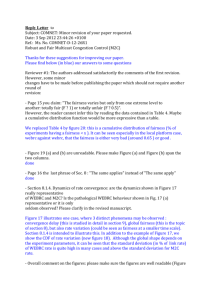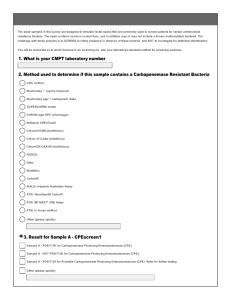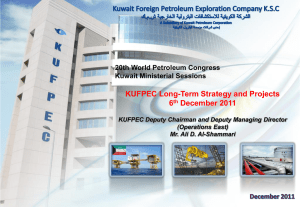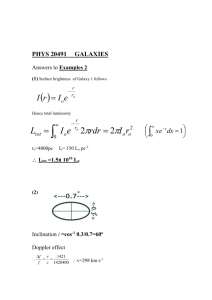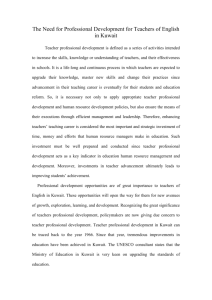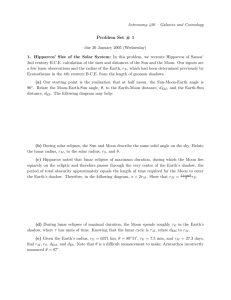Kuwait Petroleum Corporation
advertisement
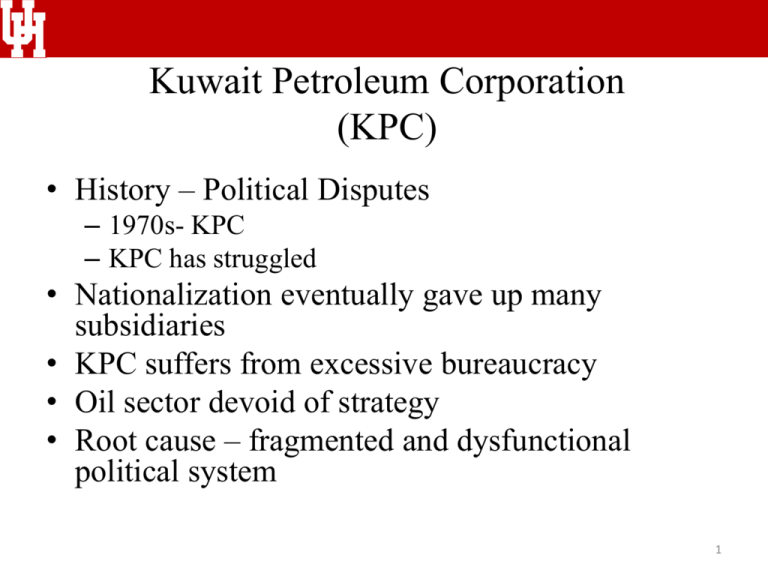
Kuwait Petroleum Corporation (KPC) • History – Political Disputes – 1970s- KPC – KPC has struggled • Nationalization eventually gave up many subsidiaries • KPC suffers from excessive bureaucracy • Oil sector devoid of strategy • Root cause – fragmented and dysfunctional political system 1 War 1 War 1 War 1 War 1 War 1 War 1 War 1 War 1 War 1 War 1 War 1 War 1 War 1 War 1 War 1 War 1 War 1 War 1 Since 1991 • Oil sector been in gridlock • Reforms adopted after Iraq invasion and liberation • Authority split • Unpopular decisions easy to veto – as in Mexico • Gov’t unable to focus on reform • Six oil ministers since 2000 • Entire oil sector gridlocked 2 Results • Performance and strategy hard to measure • Efficiency of performance hard to measure • Unlike other NOCs, KPC and affiliates produce annual reports • In theory, possible • Low upstream costs- normal for favorable geology • Authors believe performance quite poor 3 Targets • Many missed adjusted targets • Pushed capacity of 3,000,000 b/d – 2004 to 2011 • 1% gas flaring target delayed to 2011 • Postponed forth refinery • Three major accidents in domestic refineries 1 - 22 Upstream • Failed to sustain production • Growing difficulty as fields mature • “Project Kuwait” – outside investment to expand – Stalled politically 5 Central Arguments • First failure of KPC due to Kuwait’s dysfunctional political system • Lack of accountability between gov’t and the national assembly • KPC is subject to an intrusive and erratic administration • Discourage risk taking • Merely attacking KPC is a proxy for assembly to challenge the gov’t • KPC must follow onerous procurement rules (mirror’s Mexico) 6 Kuwaiti Law • Cumbersome, complex, unpredictability, horribly bureaucratic strategic choices – need four decision steps in Western companies • Endure a phalanx of thirty-six decisions in Kuwait • In Kuwait, blocked by barriers in Kuwait law and high turnover in oil ministers • Difficult to cope with environment 7 • Secondly- Strikingly weak middle-level management • Especially true in technical/engineering • People given posts for which not knowledge or experience • Is a reflection of government-laden system with political interference in promotion • Thirdly, high oil prices have masked all three problems • Small population and large accumulated reserve funds • An alternate strategy – opening the sector to outside companies difficult to adapt 8 Upstream • KPC aware of growing problem • Depletion of easy oil and more complex geology • Crude is heavier • Crude is difficult to extract • Growing fraction of water • Political gridlock has deterred entry of IOC’s good? 9 History of KPC • Created with old style conversion argument – 1934 • IV between Anglo Persian Oil (precursor to BP) and Gulf Oil • Included 93 year schedule with no provision for renegotiation • KOC had complete managerial control • Gathering storm in 1960s – 1960: Kuwaiti gov’t created KNPC to operate alongside KOC – KNPC built Shuaiba Refinery in 1970, the most modern in the world at the time 10 General Argument on Participation • 1960s – 1972 and next few years • 1972: Kuwait 25% equity at $200 bbl – Saudi: $351 – Abu Dhabi: $580 – Qutar: $592 • National Assembly demanded even more favorable terms – Revision 1973: to 40%; 1974: 60% – Mid-1974: 100% - terms never revealed 11 Problems • Large member of separate companies – all state owned • Gov’t created KPC as holding overall oil related subs • 3 Kuwaiti refineries – three separate owners • To absorb into one unit – 10 years • KOC uncooperative with intrusive KPC management 12 National Control • Legal instrument for control – “founding law” • Gave KPC the mission of being a public corporation (sec. 8.2) • KPC’s subsidiaries subject to normal Kuwaiti commercial law • “Founding law” tailored to state ownership and more regid • Substantial changes increasingly difficult to obtain with existing political gridlock 13 The War • • • • 1990: Iraq invaded Kuwait Oil sector lost many key management personnel Palestinians and Algerians declared persona not grade Liberation from Iraqi not a realistic option because National Assembly interfered in oil sector • KPC faced a growing gap in management competence • KPC slipped into introspective gridlock since could not decide own strategy and implement it • 1998: imposed greater financial controls which encourage KPC to avoid risks 14 State of Management • Early 2000: were three refinery accidents fanning outrage and eroded trust • Were symbolic of KPC’s poor performance • Reforms were pursued throughout the company • From 2004 and formally in force today is called the Strategic Management Model • Reforming KPC would require reforming the shareholder, the SPC • The oil sector has not really improved due to the political interference 1 - 33 KPC Current Organization 1 - 34 KPC Current Organization • Vertical integration requires clear strategy • Creates more of a cloud than a scheme with clear lines of authority • KPC: empowered only to make recommendations to SPC on personnel and budget • SPC: alone given authority to actually set personnel requirements and send budget forward to gov’t and National Assembly • Founding law split authority between KPC and SPC – its shareholder 1 - 35 KPC • KPC subject to direct governance by SPC • KPC are in an uncertain limbo between private and government sectors • Energy ministry and National Assembly roles are difficult to parse. • Role of National Assembly has no formal role but is required to approve budget and thus creates a large role in spending priorities 1 - 36 KPC’s Performance • Kuwait’s oil sector organized around gov’t – controlled budget system • KOC receives its capital allocation in budget set by gov’t • Refineries are sophisticated but expansion plan for 4th stalled due to expected costs due global construction boom • Refinery capacity utilization sound, some distortion due to two large fires but no signs of shortage • Production cost – Ave cost 1.29 ($ per bbl) in 2011 to 2005/6 $1.47 1 - 37 Operational Cost and Performance • Numbers shown are extremely low reflecting relatively easy geology • Because easy and low cost, efficiency not high on list of priorities • Project Kuwait was to reverse rising costs due to declining efficiency 1 - 38 Labor Related Performance • Nepotism is rife, many are employed and promoted well beyond capabilities • Kuwaitis receive a degree, return home and placed in management structure a above competent level • Process reinforce by political interference which is difficult to reverse • Interestingly, managers generally “rise from the ranks” • Little lateral movement • Problems of incompetence are poised to grow as the less competent younger generations are promoted from within 1 - 39 National Gas Performance • A new priority • Major field by KOC – March 2006 • With Schlumberger expected to supply 1.3 billion cfd • And with IOC’s develops deep horizon gas in northern fields • Goal of reducing flaring from 5.2% to 1% • Gas exploration may be given a higher priority • Possibilities are very attractive 1 - 40 Effect of Core Obligations on Performance • KPC often seen as a source that can be tapped for local benefits • KPP supplies no data as to amount of supply chain from Kuwait companies • KPC done little to catalyze broader economic development • One exception is preference for Kuwait employment • Gov’t statistical bulletin – oil sector accounts for 50% of GDP, accounts for less than 3% of direct employment 1 - 41 Technological Performance • How KPC able to general new technologies • Headquarters includes an R&D division and work driven by needs of subsidiaries • KISR (Kuwait Institute for Scientific Research) • Oil sector relies little on KISR • Conclusion that performance been poor 1 - 42 KPC’s Strategy • Vision – before Iraqi invasion, KPC had clear strategy from Ali Al-Khalifa • Conversion of KPC into a major IOC • Brief time period – had nationalized its oil industry • Newly nationalized company became a basket for all elements • Ali Al-Khalifa, now oil minister relied on two 1. Internalize KPC’s activities 2. Contain the fallout of the Iran-Iraq War • By 1982, Kuwait crude production fallen to 862 b/d from 2,623,00 b/d 1 - 43 Liberation after 1991 • Opportunity to reconsider entire KPC package • A 5 year plan emerged to be approved by KPC board • Set targets – production 3 mbd to 4 mbd by 2020 • Increasing refining capacity to 1 million b/d and 1.5 by 2020 • KPC pursues triangular approach to downstream – KPC supplies feed stock which brings management skills, technology, and risk management 1 - 44 KPC and Relationship with Government • National Assembly – plays to popular desires • Kuwait members serve constituencies populated by small number of voters • Since 1991, after reformation, ministry’s role less clear • Vision – 2020 targets are Kuwait’s official party • Rooted in internal discussion – determining crude capacity • 2020 – possible call 7 mbb, other indication that max – 4 mbd 1 - 45 Project Kuwait • Most important decision last 20 years • While country in flames, KPC sought and received technical assistance from the IOC’s • 5 technical service arguments signed with BP, Chevron, Exxon, Shell, and Total • Were willing to do as focus on quid pro quo • 1993 extended to allow investment of upstream under terms of Project Kuwait 1 - 46 Project Kuwait • Maintaining production levels difficult as depletition more difficult as crude reserves became heavier and more complex • Concern over water management in mature fields • 4 million b/d of crude by 2020 requires 12 million b/d of water • IOC entry might provide benchmark to allow assessment of KPG performance • Initial proposal of Project Kuwait was rejected by National Assembly • Locked down in “data room” • (Note: See measures taken in 1995 page 363) 1 - 47 Regulation and Competition • Regulation of oil sector and its story holds key to understanding why KPC has difficulties • Begins with Law 19 of 1973 – 2 page piece of legislation • Law intended to allow greater oversight and control (formerly regulated by Western companies) • 1975 – a set of regulation appears – turns out were just a Arabic translation of some Canadian regulations • KPC’s efforts to avoid government scrutiny were similar to those that BP and Gulf had made years ago 1 - 48 Regulations • In practice SPC and the ministry share regulatory oversight • SPC as shareholder is more effective • Civil Service Commission provides “back up regulation” • No clear regulatory strategy and the result is a degree of chaos that inhibits operational effectiveness • Government oversight is strongest is in procurement policy which involves State Audit Bureau (SAB) • Some efforts increase referral to CTC to KD 1 million • (Note: See page 367 – Sale of filling stations) 1 - 49 Conclusions • KPC has always a great deal of strategy • Lacking in consistency in political and regulatory oversight to deliver on strategic goals • KPC exposed to interest interference from a system dysfunctional • Decision making in oil sector is complex, cumbersome, unpredictable and horribly bureaucratic • An obvious reform would to be to separate roles of chairman of KPC and oil minister 1 - 50 Conclusions • KPC has some excellent managers, middle level management in KPC and its subsidiaries is exceptionally weak • Root of personnel trouble is loss in 1991 of top talent and inability to derive a scheme to identify, train, and promote the most talented workforce • Kuwait or KPC operates on a different legal biases • The gridlock created by political structure 1 - 51 The Future • Prospects are not bright may get worse • National Assembly expected to seek greater role in oil sector • A certain solution would be a fundamental reform of the political system – no longer appointed by the emir • Would reduce the emirs role to constitutional monarch • Political system has effectively stalled entry of IOCs whose presence is essential – could become worse 1 - 52 The Authors Say • Thus KPC is hamstring – by Kuwait and by its own decisions – in managing its response to an array of serious challenges. If oil prices are low for several years – or production costs continue to rise – then Kuwaiti society will find itself accustomed to an expensive lifestyle that it is unable to afford. 1 - 53
